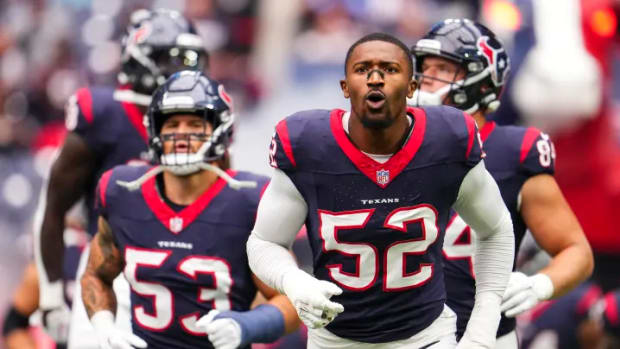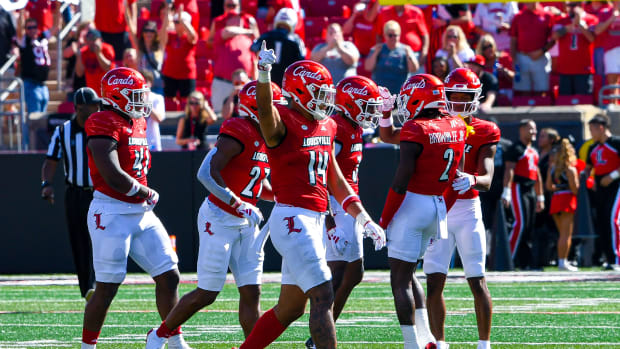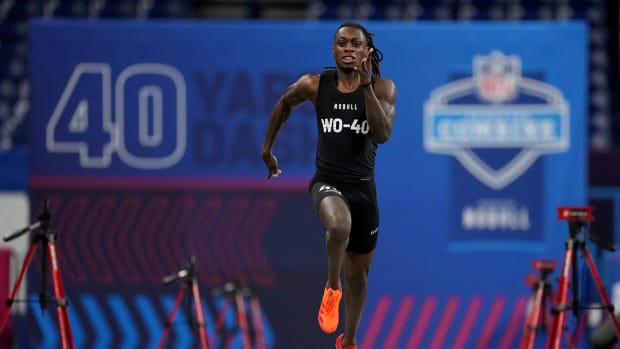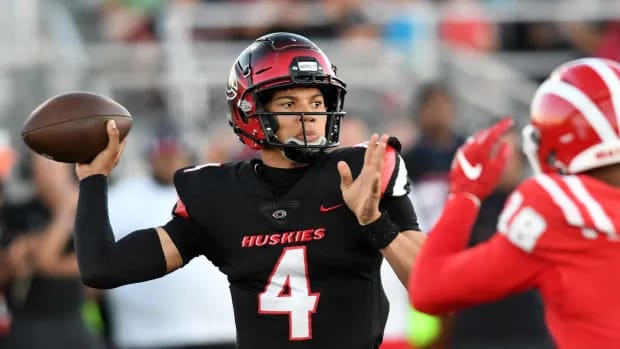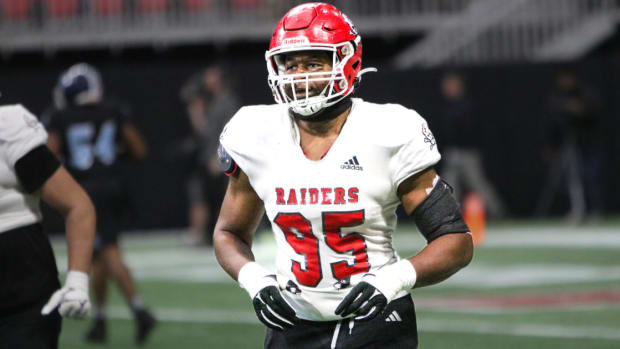Lance Taylor Working to Improve Louisville's Situational Offense, Mental Fortitude
LOUISVILLE, Ky. - Since Scott Satterfield took over as the head coach of the Louisville football program, he has transformed the Cardinals into one of the top offensive units not only in the ACC, but all of the FBS.
In every one of his three previous seasons at the helm, Louisville has ranked in the top-25 nationally in total offense per game. Last season, UofL ranked 21st nationally in yards per game at 446.2, mainly assisted by a rushing attack that came in at 22nd with 209.8 yards per game.
But as prolific of an offense that Louisville was last season, they certainly had their flaws. The Cardinals as a whole struggled to close out games, with the offense averaging 13.5 points in the second half of games compared to 18.1 in the first half. They also ranked 63rd in FBS in third down conversions with a rate of 40.0 percent. While their red zone percentage of 86.7 percent ranked 39th, it was middle of the pack by ACC standards.
Louisville wound up finishing the season with a 6-7 overall mark, but they realistically could have finished with double digit wins. The Cardinals went 2-4 last year in one score games, including three losses in a five-game stretch over the middle of the season.
To summarize a lot of Louisville's problems last year, they were a team who struggled immensely in situational football. Sure, the defense contributed to this issue as much as the other side of the line of scrimmage did, but on several occasions, the offense found themselves failing to deliver in the most crucial moments of the game.
Two of the more notorious examples of this happened against Virginia and Clemson. Louisville blew a 17-point fourth quarter lead against the Cavaliers, then could not capitalize on four straight goal-line plays in the closing minute against the Tigers. Both games ended up being one-score losses.
Lance Taylor is hoping to help the Cardinals improve in these areas.
Taylor came over from Notre Dame earlier this offseason, now serving as Louisville's offensive coordinator after Satterfield opted to run an OC by committee last season. Taylor was the running backs coach with the Fighting Irish and at Stanford, but also coached wide receivers with the Carolina Panthers and at Appalachian State.
When Taylor first accepted the job, him and Satterfield held "long conversations" regarding situational offense, with Satterfield picking his brain about what he had previously implemented at his prior stops. Taylor says that Satterfield was "very open" to what he had to say, and began implementing some of his suggestion in spring ball.
"Really, it becomes a matter of working situational football," he told Louisville Report on the "From The Pink Seats" podcast. "Putting the players in those situations, and working them like they're game-like situations. Because you can't you can't expect guys to execute unless they've been in that opportunity. They feel confident because of their preparation."
As you can imagine, Taylor and Satterfield ran numerous drills that pertained to situational offense. That included two-minute drills, four-minute drills, red zone plays and third down plays. They also ran competitive "finish drills" at the end of every single practice.
"It was at the end when you're tired, and the team that didn't win had some consequences," Taylor said. "It really sets a mentality and mindset that you got to finish. Even when you're tired, that's when the game's on the line. That's when you have to be at your best."
Instilling a "finish" mindset hasn't been limited to the gridiron. Taylor says that Louisville has also been undergoing "mental performance skill training" that has been helping them change their mindset in critical situations. One example? Watching videos of Kobe Bryant breakdown his legendary "Mamba Mentality."
"Everybody asked him how he was so good in those clutch, game-winning type moments. He said his confidence came from his preparation," Taylor said. "He had practiced that so much that when it got to the game, he was confident that he was gonna make the shot, because he was prepared. That's what we tried to do during spring practice."
Taylor says that Louisville still has a long way to go, and that they will continue to work on improving their finish mentality in fall camp, but he is "excited" about what they have accomplished in this area so far. He says his guys have become more "cognizant" of the issue, and that they have a "heightened sense of awareness" of what needs to be improved upon.
But of course, being aware of the issue and being motivated to fix it are two completely separate items. Fortunately, Taylor believes his guys aren't lacking any motivation to get better and flip some of those one-score losses from last season.
"I tell you, our players are pissed off about those losses," he said. "They're hungry. That's one of the things that I've enjoyed since being here. They have eaten up everything that I've said, and given them and challenged them, because they're tired of losing those close games. They know that we're good enough to win those games."
Taylor believes that because Louisville experienced some situational failure last season, they can more easily identify the areas that can be improved and apply their offseason training to it. The lone remaining thing to do is just execution, and it will snowball from there.
"The bottom line is you have to go out and execute it in a game, and then get confidence. ... If we execute it, now there is a confidence that builds into momentum," he said. "You carry that on like, 'Man, we worked that all offseason,' and now you see the fruits of your labor."
(Photo of Malik Cunningham, Louisville and Clemson Players: Jamie Rhodes - USA TODAY Sports)
You can follow Louisville Report for future coverage by liking us on Facebook, Twitter and Instagram:
Facebook - @LouisvilleReport
Twitter - @UofLReport
Instagram - @louisville_report
You can also follow Deputy Editor Matthew McGavic at @Matt_McGavic on Twitter
